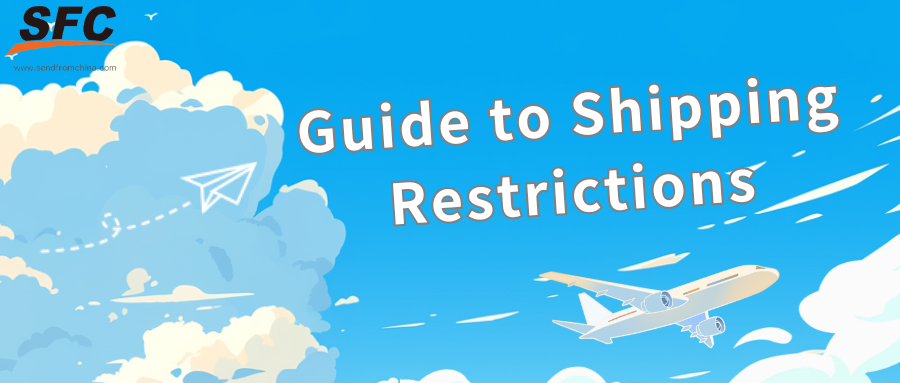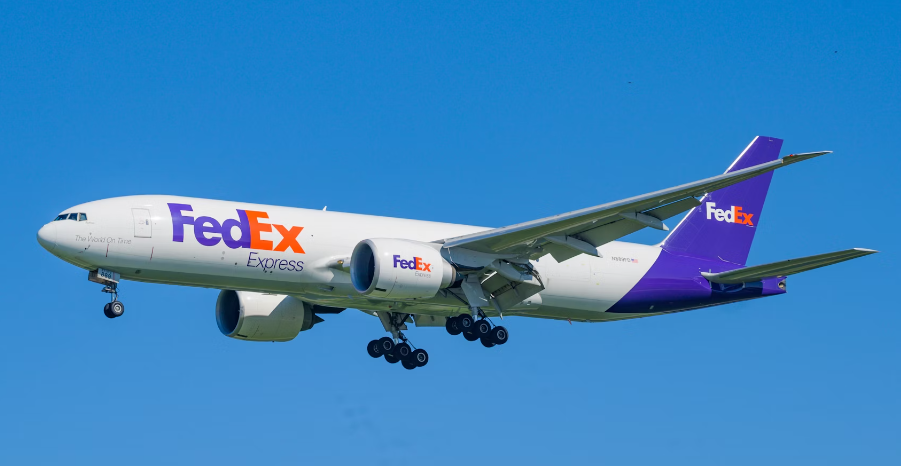Table of Contents
Get Custom eCommerce Fulfillment Service
Book a Meeting
Prohibited vs. Restricted: A Clear Guide to Shipping Restrictions
Time: Jul 26,2025 Author: SFC Source: www.sendfromchina.com
Are you confident your international parcels won’t hit unexpected roadblocks? Shipping restrictions are more than just bureaucratic red tape—they’re critical rules that define what can be sent, how it must be packaged, and where it’s allowed to go. From banned items like certain chemicals or counterfeit goods, to restricted categories such as electronics, cosmetics, or batteries, these regulations carry serious consequences when overlooked.
1. What Role Do Shipping Restrictions Play?
Shipping restrictions are the invisible lines that dictate what can be transported, where, how, and by whom. They’re not arbitrary. These rules safeguard national security, protect health and the environment, and enforce international laws.For instance:
- Lithium batteries in large quantities? Risky, due to fire hazards.
- Perfume with alcohol? Possibly flammable.
- Fresh produce? May carry invasive pests.
In essence, restrictions exist to balance trade freedom with public safety, environmental protection, and economic fairness. They're the fine print behind every logistics contract, often hidden until something goes wrong.
2. Why Do Couriers Have Shipping Restrictions?
Every courier—FedEx, DHL, UPS, EMS, or local freight forwarders—operates under a blend of international regulations, national laws, and their own internal policies. They tailor restrictions based on:
- Customs laws (country-specific)
- Insurance liabilities
- Infrastructure limitations (some routes don’t support certain containers or cargo types)
- Political or economic sanctions (e.g., dual-use goods into embargoed countries)
So, while FedEx may ship dry ice under special conditions, a local courier may completely forbid it. These differences can lead to unexpected bottlenecks if not anticipated.
3. Prohibited vs. Restricted Items: What’s the Difference?
When it comes to shipping, not all rules are created equal. Understanding the distinction between prohibited and restricted items is essential for staying compliant and avoiding costly delays or penalties.
Prohibited Items: Absolutely Never Allowed
Prohibited items are strictly banned from shipping under any circumstances. Couriers will refuse to transport them, and customs will not allow them to enter or exit a country. Attempting to ship these can lead to confiscation, fines, and even legal charges.Common categories include:
- Explosives, weapons, and ammunition (e.g. firearms, firecrackers)
- Illegal drugs and controlled substances, including prescription medications shipped without proper documentation
- Counterfeit or pirated goods, designed to infringe on intellectual property
- Endangered species products (e.g. ivory, certain animal parts under CITES)
- Highly toxic or hazardous materials, such as corrosive acids, industrial mercury, or radioactive compounds
- Live animals and human/animal remains without authorization
- Pornography or morally banned items—depending on destination laws (e.g. certain adult materials banned in Saudi Arabia)
Key point: There's no workaround—these items are a no-go from the outset.
Restricted Items: Conditional, With Rules
Unlike prohibited goods, restricted items can be shipped—but only under predefined conditions like licensing, proper packaging, or limited quantities. Each courier and destination country may apply different rules.Typical restricted categories include:
- Lithium batteries and other hazardous goods: Often require UN-certified packaging, MSDS documentation, and may only ship under “lithium battery declaration” rules; shipping batteries alone is often not permitted.
- Alcohol and tobacco products: Shippable under license, age verification, quantity limits, and import duties, depending on country.
- Medicines and medical devices: Require valid prescriptions, health certificates, or prior approval—especially for biologics or restricted pharmaceuticals
- Cultural artifacts, antiques, or artworks: May need export/import permits to prevent illicit trade or protect heritage.
- Plants, seeds, animal products: Often restricted due to biological risk or quarantine laws—may require phytosanitary certificates or inspection documentation
- High-value items or precious metals: May require special insurance, customs declarations, and secure shipping arrangements; carriers may limit liability for such goods
These items typically require complying with one or more of the following before shipment:
- Permits or licenses from regulatory authorities
- Declaring accurate HS codes and value to customs
- Special signage, labeling, and packaging (especially for dangerous goods)
- Following quantity, weight, or volume limits
- Using trusted logistics providers with specialized handling capabilities
Restricted items are not strictly forbidden, but mishandling them can lead to delays, returns, fines—or seizure.
4. Product Categories: Common Restrictions Across Carriers
Shipping restrictions vary by carrier, country, and transport mode—but certain product categories repeatedly trigger rules and red flags. Below, we explore ten major categories and how global carriers such as UPS, FedEx, DHL, USPS, and others handle them.
4.1 Lithium Batteries (Ion & Metal)
- Why restricted: Fire hazard risks from overheating, especially in air transit.- Carrier protocols:
- FedEx: Requires UN testing certification (UN 3480/3481 etc.), limited capacities (e.g., ≤100 Wh), specific packaging and declarations, and in some cases, ground-only shipping.
- UPS: Demands pre-approval, strict packaging, labeling, and carrier documentation.
- DHL: Enforces IATA compliance, detailed capacity thresholds, and carrier-specific restrictions for air shipments.
4.2 Liquids, Aerosols & Perfumes
- Why restricted: Flammability, pressurization, or environmental risk (e.g. aerosols, alcohol-based perfumes or sanitizers).- Rules: Permitted only under hazardous goods protocols, with SDS (Safety Data Sheet), UN markings, and volume caps (~8 oz glass, 16 oz plastic bottles). USPS prohibits most alcohol items, unless shipped under ground-only services with proper labeling.
4.3 Perishables & Food Items
- Why restricted: Spoilage, biohazards, and quarantine risk.- Carrier approach: FedEx & UPS allow refrigerated shipping when documented—but many perishables (like raw meat or dairy) may be outright banned or need specialized packaging. USPS often restricts perishables in international mail, even if domestically accepted.
4.4 Cosmetics, Nail Polish & Ethanol-Based Products
- Why restricted: Often flammable; may violate import safety or labeling laws.- Operational notes: DHL & FedEx: Require SDS and may refuse ethanol‑containing cosmetics (e.g. perfumes, nail polish, scented bath salts) unless approved and labelled. Carriers may allow ethanol-free cosmetics with standard shipping rules applied.
4.5 Pharmaceuticals & Medical Devices
- Why restricted: Regulatory oversight (FDA, EMA, etc.), health licensing, and potential misuse.- Key handling: FedEx and UPS require shipping under regulated pathways with full documentation, import permits, and recipient certifications. Over-the-counter dietary supplements might pass, but most prescription drugs are prohibited unless accompanied by proper paperwork and approvals.
4.6 Live Animals, Plant Seeds & Biologicals
- Why restricted: Environmental, animal welfare and quarantine concerns.- Carrier stance: Most couriers prohibit live animal shipments unless handled under specialized contracts. Plant seeds, unprocessed plants, insects often require phytosanitary certificates and may be denied if lacking documentation.
4.7 High‑Value Goods: Jewelry, Precious Metals, Gems, Currency
- Why restricted: Risk of theft, insurance liability.- Carrier approach: UPS and FedEx frequently impose declared value limits (e.g., jewelry over $1000 or art over $500K) and may require special courier services or additional cover. These goods may require Custom House Brokerage coordination and advanced notice.
4.8 Firearms, Weapons & Ammunition
- Why restricted: Crime prevention and regulated by law.- Rules: Prohibited by default, unless the shipper has specific licenses and sends via authorized freight services (often not by express couriers).
Tobacco & Vape Products
- Why restricted: Health regulations, licensing, minimum-age laws.- Carrier policies: UPS prohibits all tobacco shipments; FedEx bans e-cigarettes entirely; USPS allows very limited exceptions with state-level controls.
Chemicals, Solvents & Cleaning Agents
- Why restricted: Toxicity, corrosiveness, fire risk.- Carrier enforcement: Strong emphasis on SDS, UN hazard labeling, proper containment. Common consumer products like bleach, nail polish remover, insecticides, household cleaners often cannot be shipped internationally without classification and proper packing.
5. Government Export Controls & Trade Laws
Shipping doesn’t end once your package departs. For many businesses—especially those exporting high-tech products, dual-use goods, controlled chemicals, or sensitive materials—the most critical boundaries are drawn by government export controls and trade laws. These regulations determine what you are legally permitted to send across borders, to whom, and where.
Legal Framework: EAR, ITAR, ECRA & More
Export Administration Regulations (EAR)
Managed by the U.S. Department of Commerce’s Bureau of Industry and Security (BIS), EAR governs the export of dual-use items—those with legitimate civilian use but also military or proliferation potential. These items fall under detailed Export Control Classification Numbers (ECCNs) or less controlled EAR99 classifications. Violating EAR rules can lead to severe penalties, including criminal charges.International Traffic in Arms Regulations (ITAR)
Administered by the U.S. State Department’s Directorate of Defense Trade Controls (DDTC), ITAR applies to defense articles and technical services listed on the U.S. Munitions List (USML). Any export or transfer—even of related technical data—requires strict licensing. Non-compliance has led to multi-million-dollar penalties and export bans.Export Control Reform Act (ECRA)
Enacted in 2018, ECRA serves as the legal foundation enabling EAR enforcement. It grants the U.S. President authority to regulate the export of sensitive goods and technologies.Why Export Controls Exist
Governments impose export controls to protect:- National security by preventing weapons proliferation.
- Foreign-policy objectives, including sanctions enforcement.
- Economic stability, by preventing sensitive tech from unauthorized users.
Dual-use items like semiconductors, encryption software, drones, or AI hardware face scrutiny because they can be misused in military or surveillance applications.
Recent Tightening & Emerging Trends (2024–2025)
— Expanded BIS Controls (July 2024)
The U.S. Bureau of Industry and Security proposed broader restrictions related to military and intelligence export controls, increasing scope for licensing and enforcement.— Semiconductor & AI Chip Restrictions
New 2022‑2025 rules limit exports of advanced computing, AI systems, and semiconductor manufacturing tools—especially to China and similar jurisdictions. These apply not just to hardware, but also to software and key design data.— Project 2025 Vision
Drafted in early 2025, Project 2025 outlines reforms such as reducing de minimis thresholds (e.g. foreign content trigger from 25% down to 10%), tightening license exceptions, and reclassifying country risk groups. These changes aim to close loopholes in EAR enforcement.— Global Trade Enforcement
Countries like the U.S., EU, and UK are expanding export laws to ban imports or exports of products tied to forced labor or geopolitical threats. Export compliance now also involves labor origin verification and sanction list checks.— Rare-Earth & Critical Mineral Controls
China has imposed new licensing requirements and export limits on minerals like gallium, germanium, and titanium. This has disrupted global electronics and EV supply chains. Many exporters face delays, licensing backlogs, and unexpected inspections.International Sanctions & Cross-Industry Impact
Country-Based Sanctions
Export controls are often tied to sanctions regimes. For example, EU sanctions on Russia now prohibit exports of aluminum, chemicals, and industrial equipment. The U.S. and EU periodically blacklist entities and vessels to cut off trade routes.Navigating Country Lists
Beyond country bans, lists like the BIS Entity List, Unverified List, and Denied Persons List restrict dealings with certain companies or individuals. Exporters must screen clients against these lists to avoid inadvertent violations.What Export Controls Mean for Shippers
Scenario |
Implications for Shippers |
|---|---|
Exporting a drone with Wi-Fi module |
Likely dual-use—EAR licensing required; check ECCN and destination restrictions. |
| Sending AI server racks to China | Covered by new BIS rules—requires license; shipping blocked for embargoed end users. |
Shipping surveillance software overseas |
Classified under ITAR if tied to defense—license mandatory from State Department. |
Exporting lithium-containing heat flux tubes |
May cover both hazardous goods and controlled tech—dual permits needed. |
Sending goods to a company on Entity List |
Export denied regardless of product—export license will be refused. |
6. Customs & Value Thresholds: Lowest‑Value Traps
Here’s where many businesses trip up: Customs authorities don't just care what you ship—they care about how much it's worth.- De minimis value: Some countries allow duty-free import below a certain value (e.g., USD $800 in the U.S.). Go over, and taxes or paperwork kicks in.
- Invoice manipulation: Undervaluing products to reduce duties can lead to confiscation and blacklisting.
- Gift loopholes: Marking a shipment as a “gift” over the threshold may get flagged.
Lesson: Always declare true value and understand the "duty cliff" for your recipient’s country.
7. Country‑Specific Lists: Variation by National Rules
Each country has its own shipping quirks. Here’s a snapshot:| Country | Unique Restrictions |
|---|---|
| USA | FDA rules on food/cosmetics, ITAR for arms, hazmat enforcement |
| Australia | Strict on organic goods, wood packaging, plant materials |
| Brazil | National ID required for all imports, delays common |
| Russia | Restrictions on electronics, documents, and data storage |
| China | Sensitive to politically-related content or tech equipment |
| Saudi Arabia | Prohibits religious items contrary to Islam, drugs, sex-related items |
Before shipping, consult that country’s customs and import guidelines. Don’t rely solely on your courier’s advice—they might not be liable for a seized parcel.
8. How To Avoid Problems: Best Practices Checklist
Shipping restricted or high-risk items—whether lithium batteries, cosmetics, export‑controlled tech, or perishable goods—demands careful planning. Below is a field‑tested checklist to help ensure smooth, compliant deliveries and minimize risk across carriers and customs.
Research Commodity‑Specific Rules
- Consult carrier policies: Every courier (UPS, FedEx, DHL, USPS, etc.) publishes in-depth lists for prohibited and restricted items. Review the latest versions before shipping.- Check destination regulations: Customs laws can vary widely by country—what’s permitted in one may be blocked in another.
Classify Products with Accuracy
- Use correct HS codes: Harmonized System codes determine duties and restriction rules. Misclassification can lead to fines or delays.- Declare accurate value: Avoid under-declaring to bypass duty thresholds. Customs audits may lead to penalties or confiscation.
Prepare Precise Documentation
- Commercial invoice & packing list: Include product description, origin, HS code, quantity, and accurate value.- Certificates and licenses: For restricted goods (e.g. pharmaceuticals, cosmetics, medical devices, food, tech) secure permits or health certificates in advance.
- Material Safety Data Sheets (MSDS): Must accompany hazardous goods such as chemicals, aerosols, or lithium batteries.
Screen Party Risk
- Restricted/Denied Party screening: Screen customers, resellers, and partners (including IPs, companies, addresses) against international denied-party lists like OFAC and BIS Entity List.Prioritize Packaging & Labeling
- Follow packaging rules: Lithium batteries require UN-certified packaging and labels (e.g., UN 3480/3481) and proper cushioning.- Use clear labels: For hazardous or restricted items, labels must include hazard symbols, chemical names, or handling instructions. Mislabeling can invalidate insurance or shipment eligibility.
Request Pre‑Approval When Needed
- If you ship high-value goods, alcohol, perishables, or medical items, contact carrier freight specialists in advance. Some goods are allowed only on contractual terms or require approval even if technically allowed.Choose the Right Transportation Mode
- Air vs Ground: Certain HAZMAT or limited quantity items (e.g., lithium batteries, nail polish remover) can only go via ground/sea, never by air.- Track local surface regulations: Some carriers disallow ORM‑D or similar limited-quantity labels on air shipments within/between certain regions.
Insure High‑Risk Shipments
- Extra insurance: High-value, perishables, fragile items or cargo that might be delayed should carry additional insurance or declared value to protect your investment.Use Technology & Track Supply Chains
- Real-time tracking: Monitor every stage of shipment to detect transit issues or customs holds early.- Document automation: Use software or platforms that auto-generate required shipping paperwork and keep record logs for audits or compliance reviews.
Audit & Update Compliance Processes
- Regular compliance review: Revise your shipping policies periodically, especially after regulatory changes (e.g., de minimis value shifts, export control expansions).- Staff training: Provide updated training for operations, procurement, and logistics teams. They should know how to classify, document, label, and screen shipments properly.
9. Business Impact & Recent Market Shifts
Shipping restrictions are more than logistical headaches—they drive profound shifts in strategy, cost, and competitiveness across global commerce. Recent market developments—from tariff reforms to supply chain turbulence—have elevated compliance from a back-office concern to a core business risk.
De Minimis Duty End in the U.S.: A Game‑Changer
On May 2, 2025, the U.S. formally ended its $800 de minimis exemption for low‑value imports from China and Hong Kong—a move that shook up cross-border e-commerce. What was once duty-free now requires detailed customs entry, duties, and potential delays. Retailers saw tariffs up to 145%, with USPS and major carriers adjusting to the new reality.Business repercussions:
- Margins compressed, especially for small, direct‑from‑China sellers. Some brands raised prices or rerouted to U.S. domestic warehouses, while others ceased shipping altogether.
- Consumer experience worsened, with delays and unexpected import fees harming loyalty and conversion.
- Domestic brands gained some ground as cheaper imports became less viable in the market.
Shifting Consumer Expectations & Elevated Service Demands
Reports like DHL E‑Commerce Trends 2025 and other industry surveys highlight how rising customer expectations are adding pressure:- Delivery remains the #1 conversion trigger. Around 81% of shoppers abandon carts when preferred delivery options are missing.
- However, consumers now value reliability, cost transparency, and sustainability even more than sheer speed.
- Environmental concerns are reshaping expectations—brands lacking carbon‑neutral options may lose customers.
This trend means businesses must balance compliance hurdles with delivery excellence—especially under rising regulatory complexity.
Supply Chain Disruptions & Route Realignments
The logistics landscape remains volatile:- The Red Sea crisis (2023–24) caused major carriers to reroute goods around Africa, adding up to 10 extra days and significant fuel costs. Container rates spiked, and global schedules were thrown off.
- Ongoing labour disputes at ports and congestion continue to complicate operations.
- Trade tensions and new tariffs (e.g. U.S.–China restrictions) prompted shipping surges in early 2025 as retailers front-loaded inventory. Shipping rates on key U.S. West Coast routes nearly doubled.
Companies are forced to diversify routes, split shipments, or relocate warehousing closer to demand centers.
Strategic Shifts & Adaptation in the Face of Regulation
Retailers are retrenching and adapting to the complex mix of rising costs, shifting trade rules, and evolving compliance demands:- Many small businesses are eliminating free shipping perks, adjusting thresholds, or charging for delivery to offset tariff and rate hikes. Reduced cart conversions are a real risk.
- Continued trade friction with China is driving relocalization, including investment in U.S. warehouses to minimize customs exposure.
- Brands are investing in automation and customs compliance tech, transitioning to bonded warehousing and structured logistics flows. Jobs like customs brokerage and denied‑party screening are now front and center.
10. Conclusion
Shipping restrictions are no longer niche knowledge—they’re central to global commerce. Whether you're sending a single parcel or managing bulk containers, navigating this complex maze requires awareness, precision, and strategic foresight.At SendFromChina, we specialize in helping you avoid legal missteps, optimize delivery routes, and unlock new markets—safely and legally. Don’t let restrictions stop your growth. Let them guide smarter business.
11. FAQs
Q1: Can I ship lithium batteries by air?
Yes, but only with specific packaging, documentation (MSDS), and often quantity restrictions. Not all couriers accept them.Q2: What happens if I ship a prohibited item by mistake?
It may be seized or destroyed. You could also face fines or suspension from the courier's service.Q3: Is it illegal to mark high-value items as “gifts”?
Yes, misdeclaration can be considered customs fraud. Always declare true value and purpose.Q4: How do I find my destination country’s shipping rules?
Check the official customs authority website or ask your freight forwarder. Don’t rely solely on Google or chat forums.Q5: Do I need a license to export cosmetics?
Sometimes. Depends on alcohol content, ingredients, and the destination country’s regulations. Post Views:13757
Post Views:13757
Copyright statement: The copyright of this article belongs to the original author. Please indicate the source for reprinting.
Previous Post
What Is 3PL Business Model? A Complete Guide for Brands & Providers
Next Post
TAGS
Hot Research
Get Custom eCommerce Fulfillment Service
Book a Meeting
Get a Custom China Fulfillment Solution with FREE Storage for 30 Days
 Want to know about our services, fees or receive a custom quote?
Want to know about our services, fees or receive a custom quote?
 Please fill out the form on the right and we will get back to you within a business day.
Please fill out the form on the right and we will get back to you within a business day.
 The more information you provide, the better our initial response
will be.
The more information you provide, the better our initial response
will be.





 TAGS:
TAGS: